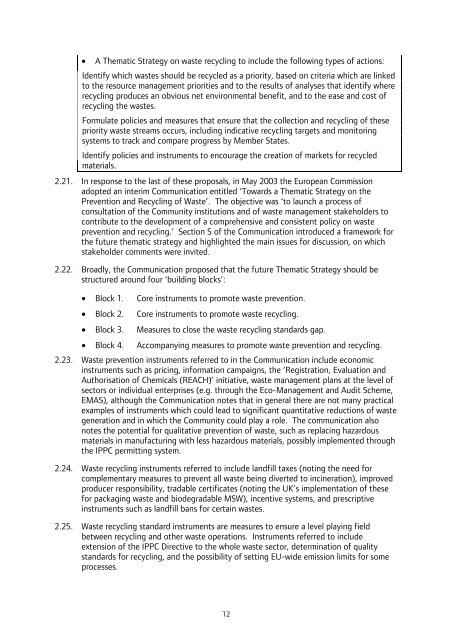London Wider Waste Strategy - London - Greater London Authority
London Wider Waste Strategy - London - Greater London Authority
London Wider Waste Strategy - London - Greater London Authority
Create successful ePaper yourself
Turn your PDF publications into a flip-book with our unique Google optimized e-Paper software.
• A Thematic <strong>Strategy</strong> on waste recycling to include the following types of actions:<br />
Identify which wastes should be recycled as a priority, based on criteria which are linked<br />
to the resource management priorities and to the results of analyses that identify where<br />
recycling produces an obvious net environmental benefit, and to the ease and cost of<br />
recycling the wastes.<br />
Formulate policies and measures that ensure that the collection and recycling of these<br />
priority waste streams occurs, including indicative recycling targets and monitoring<br />
systems to track and compare progress by Member States.<br />
Identify policies and instruments to encourage the creation of markets for recycled<br />
materials.<br />
2.21. In response to the last of these proposals, in May 2003 the European Commission<br />
adopted an interim Communication entitled ‘Towards a Thematic <strong>Strategy</strong> on the<br />
Prevention and Recycling of <strong>Waste</strong>’. The objective was ‘to launch a process of<br />
consultation of the Community institutions and of waste management stakeholders to<br />
contribute to the development of a comprehensive and consistent policy on waste<br />
prevention and recycling.’ Section 5 of the Communication introduced a framework for<br />
the future thematic strategy and highlighted the main issues for discussion, on which<br />
stakeholder comments were invited.<br />
2.22. Broadly, the Communication proposed that the future Thematic <strong>Strategy</strong> should be<br />
structured around four ‘building blocks’:<br />
• Block 1. Core instruments to promote waste prevention.<br />
• Block 2. Core instruments to promote waste recycling.<br />
• Block 3. Measures to close the waste recycling standards gap.<br />
• Block 4. Accompanying measures to promote waste prevention and recycling.<br />
2.23. <strong>Waste</strong> prevention instruments referred to in the Communication include economic<br />
instruments such as pricing, information campaigns, the ‘Registration, Evaluation and<br />
Authorisation of Chemicals (REACH)’ initiative, waste management plans at the level of<br />
sectors or individual enterprises (e.g. through the Eco-Management and Audit Scheme,<br />
EMAS), although the Communication notes that in general there are not many practical<br />
examples of instruments which could lead to significant quantitative reductions of waste<br />
generation and in which the Community could play a role. The communication also<br />
notes the potential for qualitative prevention of waste, such as replacing hazardous<br />
materials in manufacturing with less hazardous materials, possibly implemented through<br />
the IPPC permitting system.<br />
2.24. <strong>Waste</strong> recycling instruments referred to include landfill taxes (noting the need for<br />
complementary measures to prevent all waste being diverted to incineration), improved<br />
producer responsibility, tradable certificates (noting the UK’s implementation of these<br />
for packaging waste and biodegradable MSW), incentive systems, and prescriptive<br />
instruments such as landfill bans for certain wastes.<br />
2.25. <strong>Waste</strong> recycling standard instruments are measures to ensure a level playing field<br />
between recycling and other waste operations. Instruments referred to include<br />
extension of the IPPC Directive to the whole waste sector, determination of quality<br />
standards for recycling, and the possibility of setting EU-wide emission limits for some<br />
processes.<br />
12
















